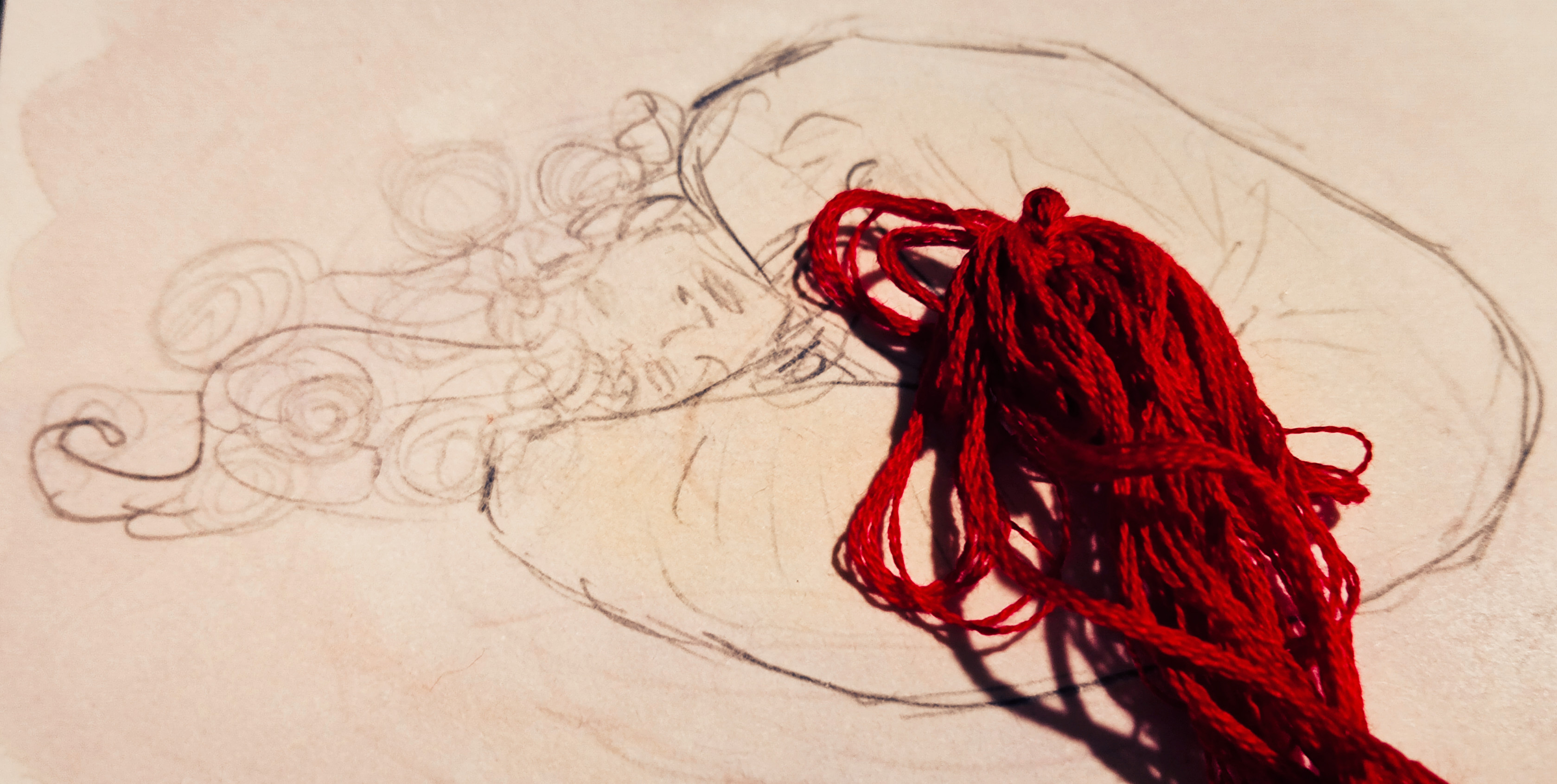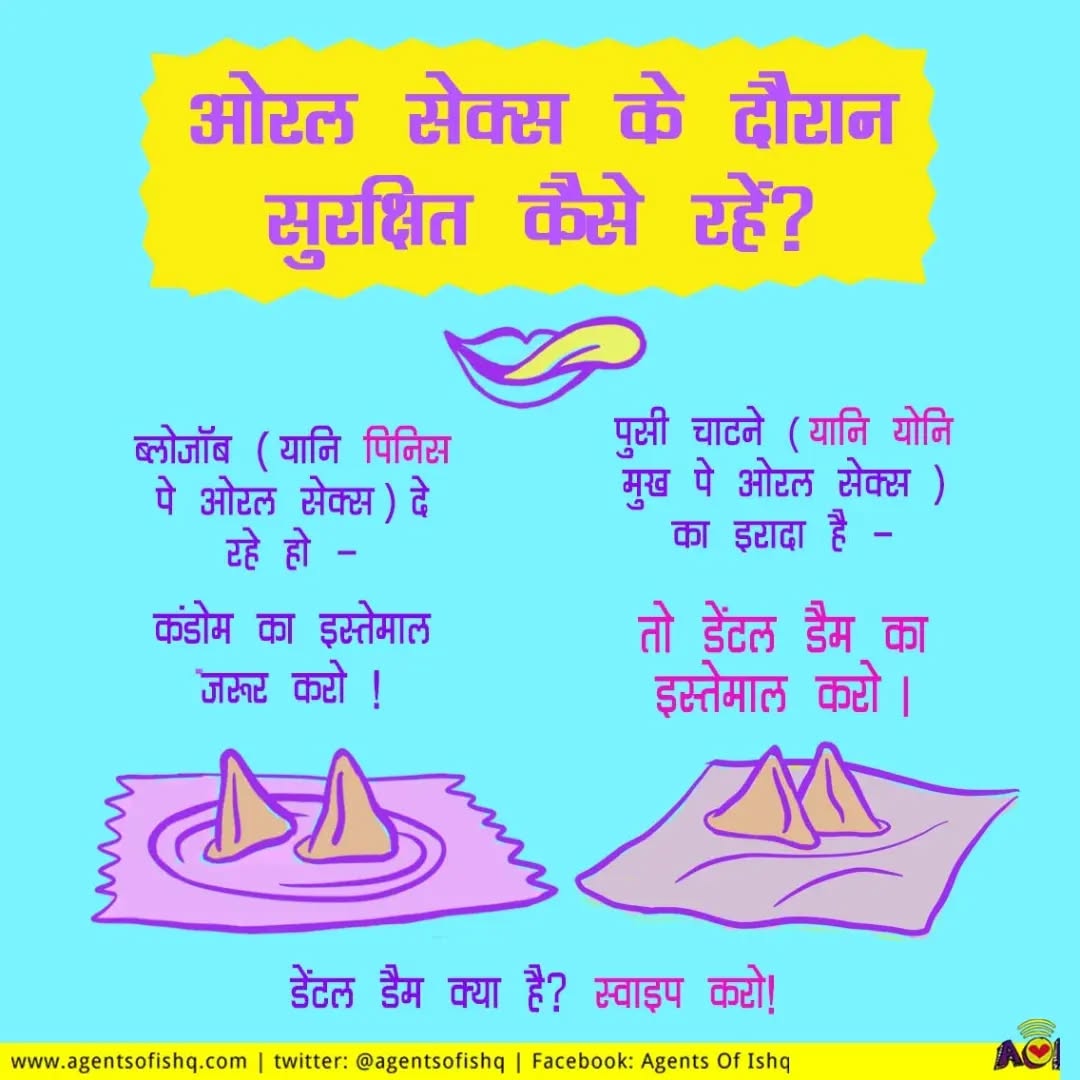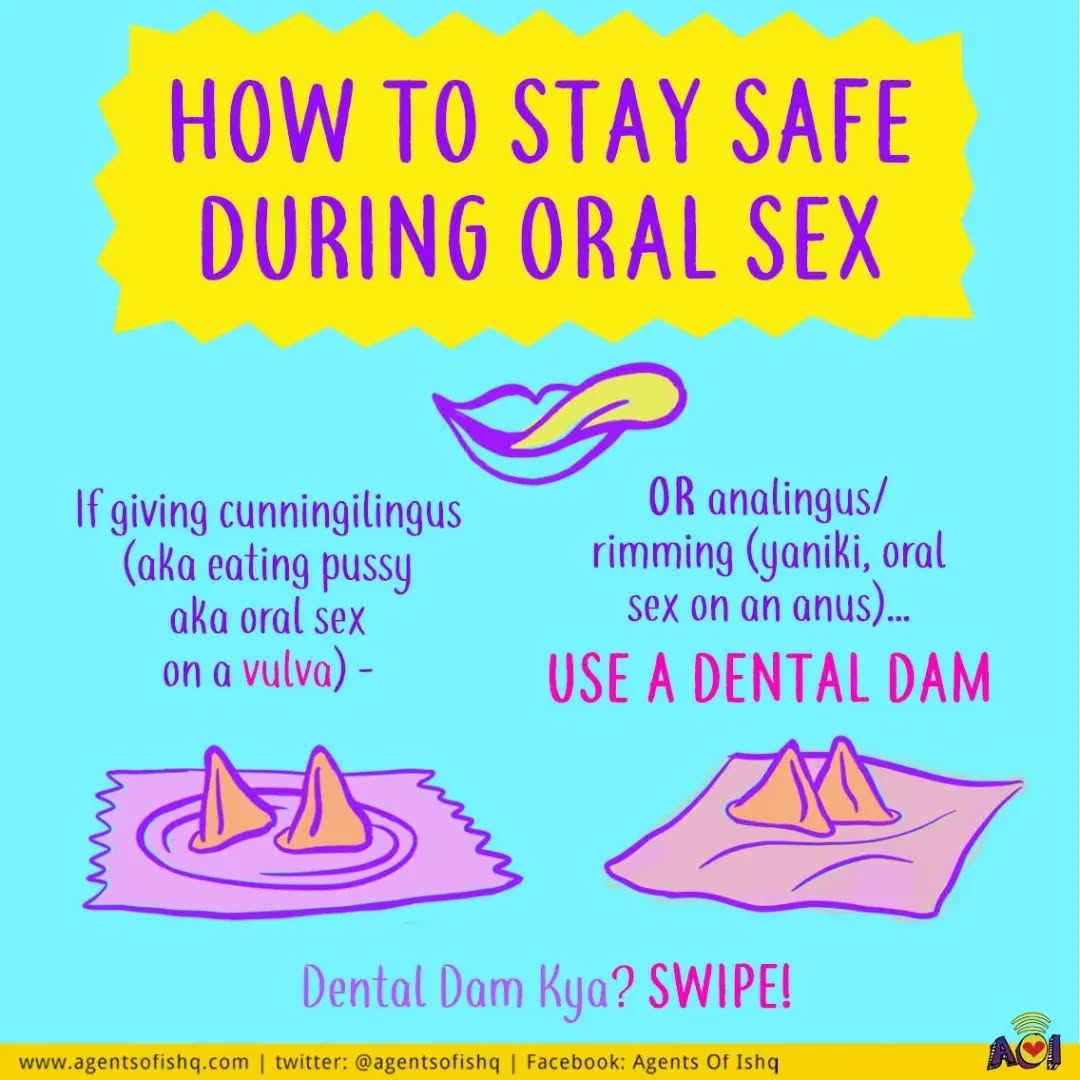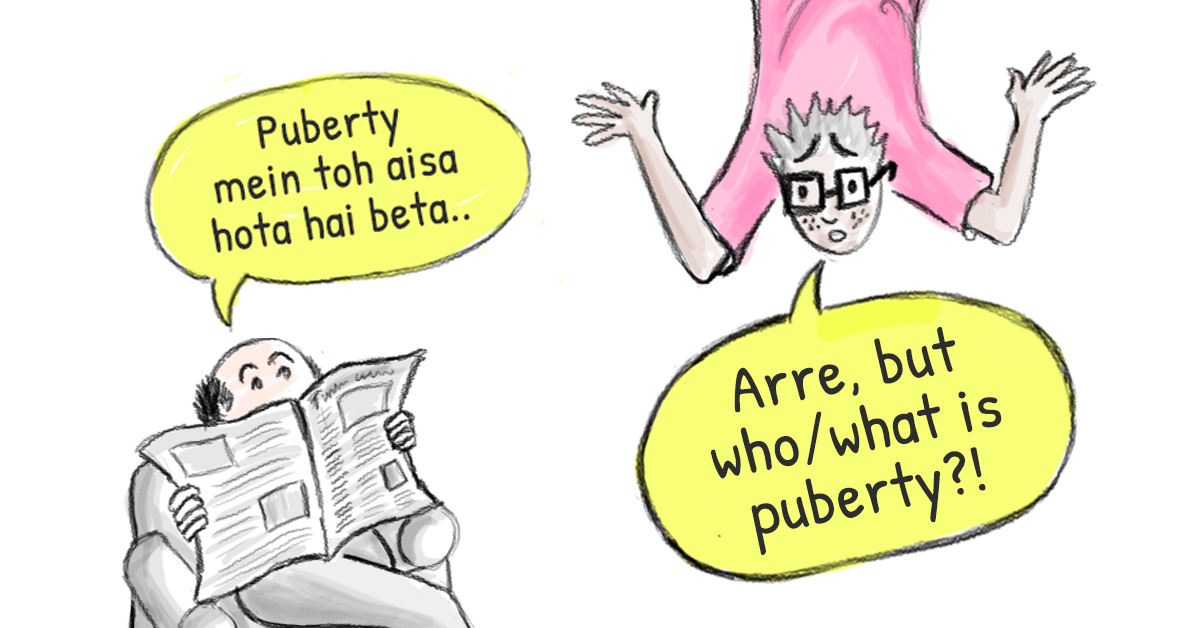 Puberty is when your brain signals to your sexual organs ki it’s time to grow up and approach sexual maturity. Usually, iska onset begins for vagina owners between 10 and 14 years, and between 12 and 18 years for others, starting a whole hormone ka webseries inside your body. Scientific language mein bole toh, your hypothalamus starts to secrete GnRH (gonadotrophin-releasing hormone), which sends ishaara to you pituitary glands to release FSH (follicle-stimulating hormone) and luteinizing hormone. Isse your ovaries and testes start to develop and secrete estrogen and testosterone. The proportions of these two hormones primarily dictate how your body will develop and look — jaise ki, hair will begin to grow near your genitals and underarms, and for testosterone-majors, on the face too; your voice may first ‘crack’ and then deepen; your sexual organs and your breasts, penis and testicles will grow, as will you in height and probably weight. All this activity tires your body out more than usual, which means you may feel sleepier and more irritable than before. Puberty hits everyone, but at different times and in different ways. So don’t worry if your body is reacting differently than your classmates and friends’...aal izz well!
Puberty is when your brain signals to your sexual organs ki it’s time to grow up and approach sexual maturity. Usually, iska onset begins for vagina owners between 10 and 14 years, and between 12 and 18 years for others, starting a whole hormone ka webseries inside your body. Scientific language mein bole toh, your hypothalamus starts to secrete GnRH (gonadotrophin-releasing hormone), which sends ishaara to you pituitary glands to release FSH (follicle-stimulating hormone) and luteinizing hormone. Isse your ovaries and testes start to develop and secrete estrogen and testosterone. The proportions of these two hormones primarily dictate how your body will develop and look — jaise ki, hair will begin to grow near your genitals and underarms, and for testosterone-majors, on the face too; your voice may first ‘crack’ and then deepen; your sexual organs and your breasts, penis and testicles will grow, as will you in height and probably weight. All this activity tires your body out more than usual, which means you may feel sleepier and more irritable than before. Puberty hits everyone, but at different times and in different ways. So don’t worry if your body is reacting differently than your classmates and friends’...aal izz well! 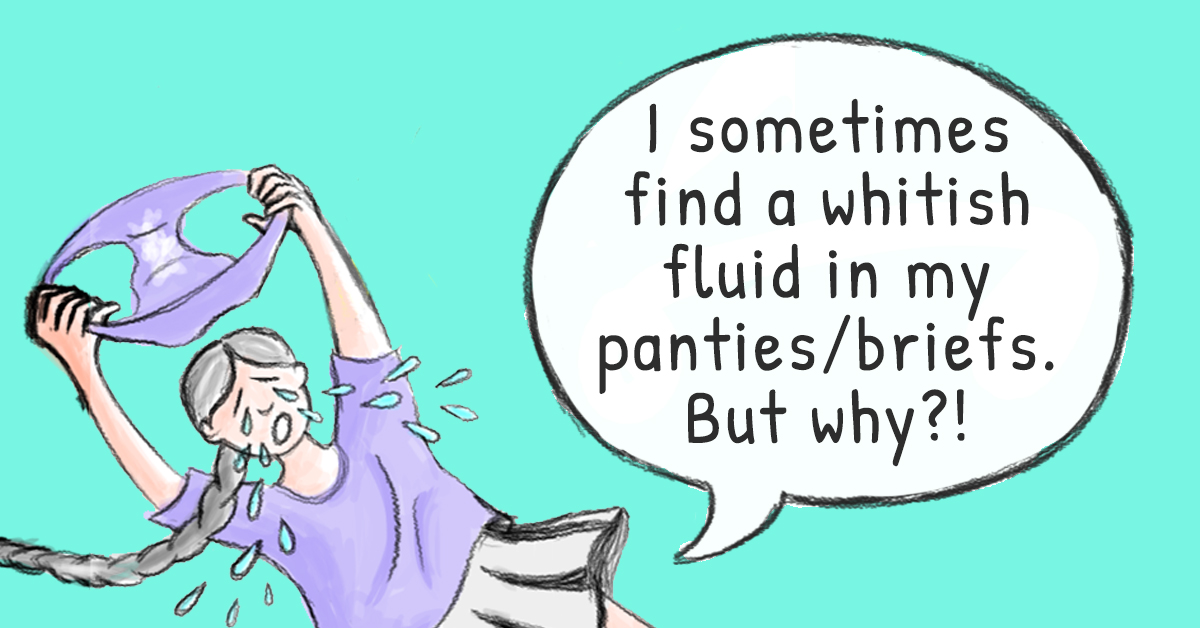 The thin, whitish or transparent fluid in your chaddis is known as vaginal discharge and is completely normal at the start of puberty. Your body is producing estrogen, which tells the glands in your vagina to produce whitish mucus (thicker than before). If you start noticing white discharge, that’s your ovary releasing eggs and it might mean you will start menstruating soon. Lekin, if you notice the fluid developing a smell or turning yellowish, you should alert your guardians or a doctor since it could mean an infection.
The thin, whitish or transparent fluid in your chaddis is known as vaginal discharge and is completely normal at the start of puberty. Your body is producing estrogen, which tells the glands in your vagina to produce whitish mucus (thicker than before). If you start noticing white discharge, that’s your ovary releasing eggs and it might mean you will start menstruating soon. Lekin, if you notice the fluid developing a smell or turning yellowish, you should alert your guardians or a doctor since it could mean an infection. 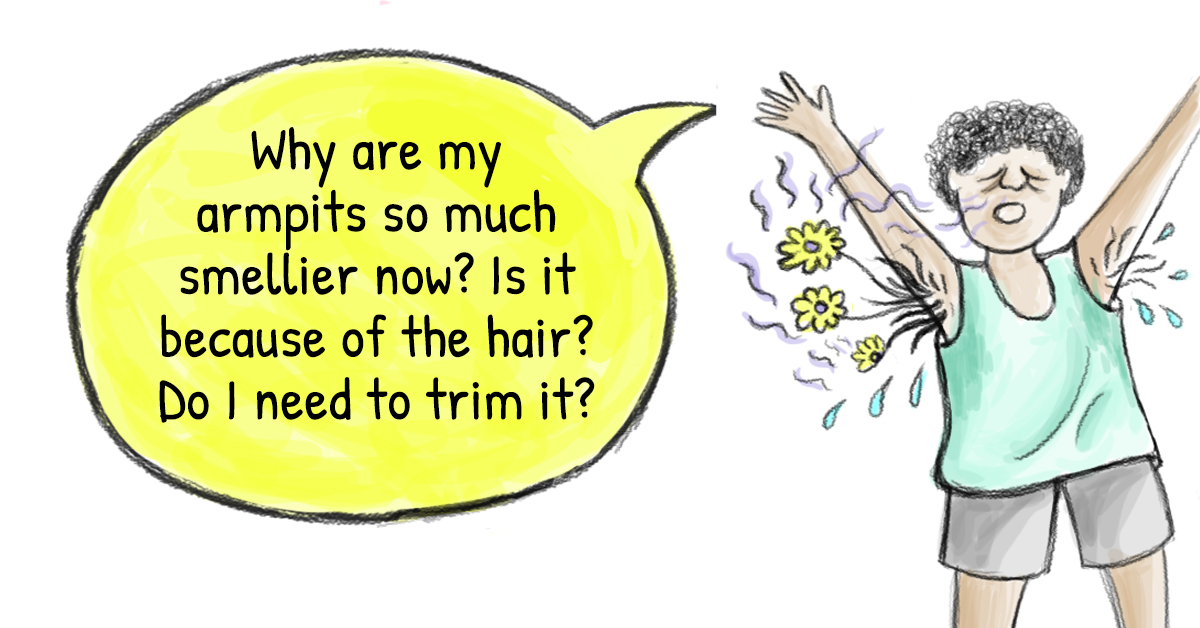 One of the changes in your body during puberty is that you grow more hair on your armpits, limbs and privates. Since your sweat glands also start to work overtime during puberty and secrete chemicals into the sweat, this means the new hair growth helps accumulate sweat. Plus, your skin and hair will tend to get oily more frequently. All this adds up to some not-so-nice fragrance which might be why you feel smellier than before. There’s not much you can do about it other than using a good deodorant and bathing more often. Hair removal might help you feel cleaner, but it doesn’t actually make much difference in terms of smell or sweat, sorry!
One of the changes in your body during puberty is that you grow more hair on your armpits, limbs and privates. Since your sweat glands also start to work overtime during puberty and secrete chemicals into the sweat, this means the new hair growth helps accumulate sweat. Plus, your skin and hair will tend to get oily more frequently. All this adds up to some not-so-nice fragrance which might be why you feel smellier than before. There’s not much you can do about it other than using a good deodorant and bathing more often. Hair removal might help you feel cleaner, but it doesn’t actually make much difference in terms of smell or sweat, sorry! 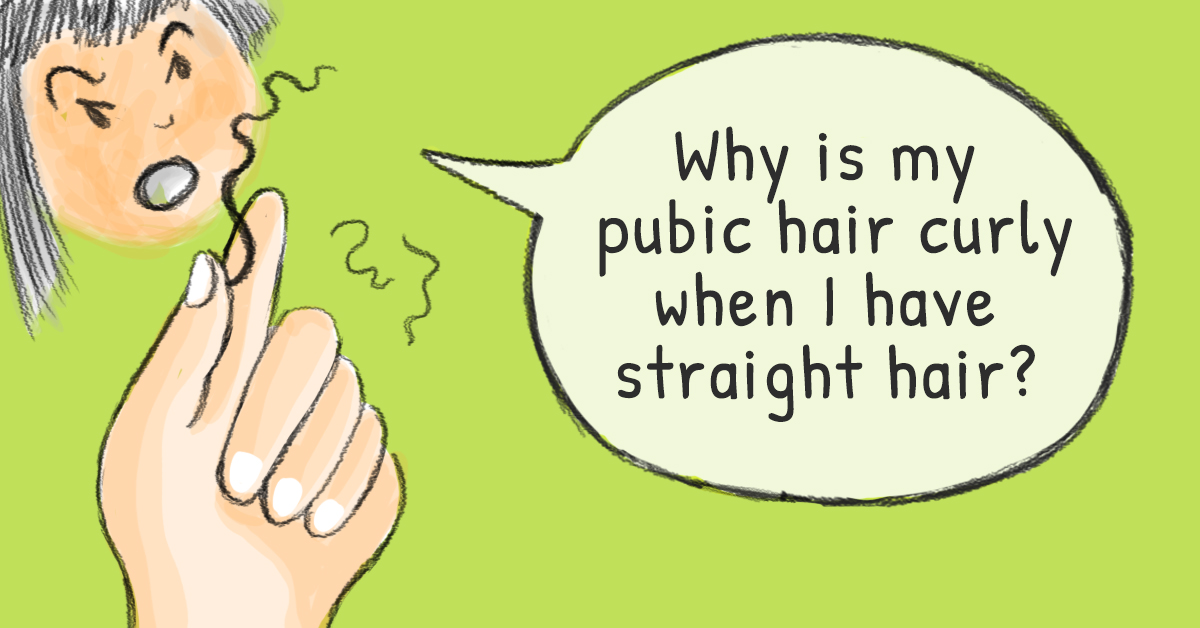 Scientists believe pubic hair was intended to trap pheromones – apparently, if we were still in the habit of roaming around naked, like gorillas, a nice pungent bu from your genital area would act as an aphrodisiac for other humans — and curly hair helped this process. Prehistoric zamaane ka Axe deodorant huh? Pubic hair usually grows to a max length of 1-1.5 inches, which is when it fully curls usually, but obviously not sabke liye...some people do have straight pubic hair. Also, occasionally, pubic hair can even be a different colour from your baaki ka hair (it is said to most closely resemble the colour of your eyebrows). Since it’s coarser and denser than the rest of your body hair, pubic hair protects your genitals and scrotum from excess friction, moisture, external bacteria and foreign particles – your privates ke security guard. If you’re looking to tame your pubic hair, try natural body soaps and trimming regularly. Shaving your pubes too often is not a good idea since it can make the sensitive skin of your pubes feel itchy when the hair grows back, leading to rashes and infection.
Scientists believe pubic hair was intended to trap pheromones – apparently, if we were still in the habit of roaming around naked, like gorillas, a nice pungent bu from your genital area would act as an aphrodisiac for other humans — and curly hair helped this process. Prehistoric zamaane ka Axe deodorant huh? Pubic hair usually grows to a max length of 1-1.5 inches, which is when it fully curls usually, but obviously not sabke liye...some people do have straight pubic hair. Also, occasionally, pubic hair can even be a different colour from your baaki ka hair (it is said to most closely resemble the colour of your eyebrows). Since it’s coarser and denser than the rest of your body hair, pubic hair protects your genitals and scrotum from excess friction, moisture, external bacteria and foreign particles – your privates ke security guard. If you’re looking to tame your pubic hair, try natural body soaps and trimming regularly. Shaving your pubes too often is not a good idea since it can make the sensitive skin of your pubes feel itchy when the hair grows back, leading to rashes and infection. 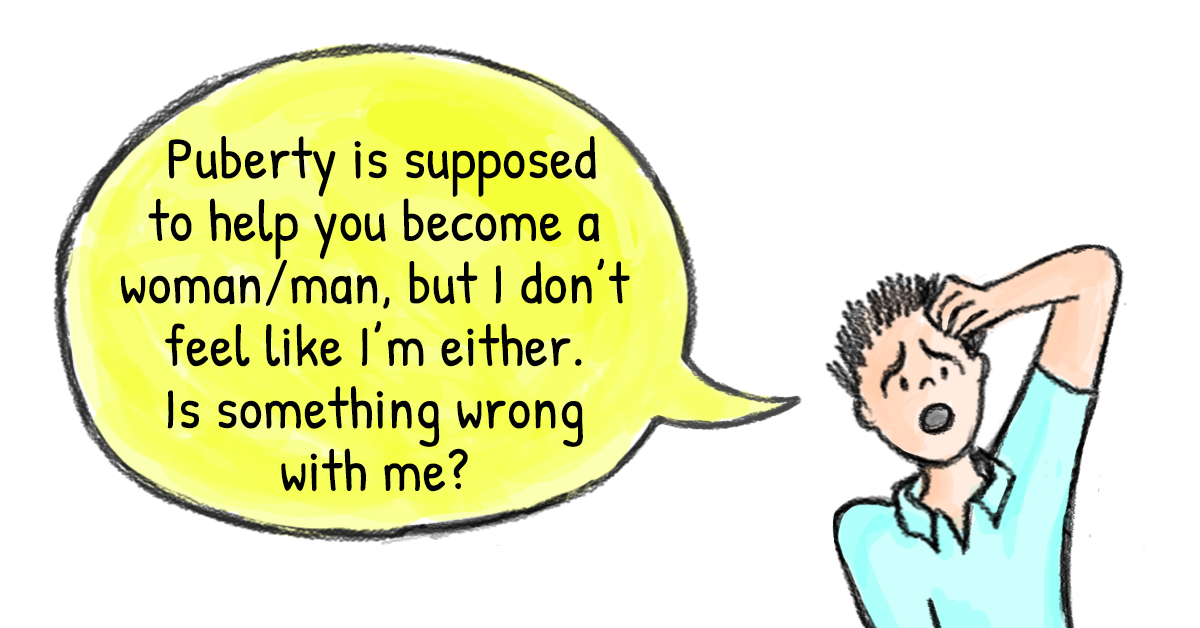 No, because puberty helps you grow into an adult of any gender. Being a man, woman or any other gender is not based on your biology. Your sex predicts how your body responds to the hormones being released during puberty, but your gender is something you feel. You don’t have to be limited to choosing between being a man or a woman. You may identify as transgender, non-binary or gender agnostic, for instance. Hormones change how you respond to the world when puberty arrives. It can be a time of self-discovery as you learn what you’re attracted to and what feels natural to you. The important part is to let yourself do whatever feels right. Remember, nothing is hard and fast. The biological changes may end when puberty does, but you can choose to change your body and/or your gender at any point. If your feelings are confusing you at any point, it may be helpful to speak to a counsellor or therapist.
No, because puberty helps you grow into an adult of any gender. Being a man, woman or any other gender is not based on your biology. Your sex predicts how your body responds to the hormones being released during puberty, but your gender is something you feel. You don’t have to be limited to choosing between being a man or a woman. You may identify as transgender, non-binary or gender agnostic, for instance. Hormones change how you respond to the world when puberty arrives. It can be a time of self-discovery as you learn what you’re attracted to and what feels natural to you. The important part is to let yourself do whatever feels right. Remember, nothing is hard and fast. The biological changes may end when puberty does, but you can choose to change your body and/or your gender at any point. If your feelings are confusing you at any point, it may be helpful to speak to a counsellor or therapist. 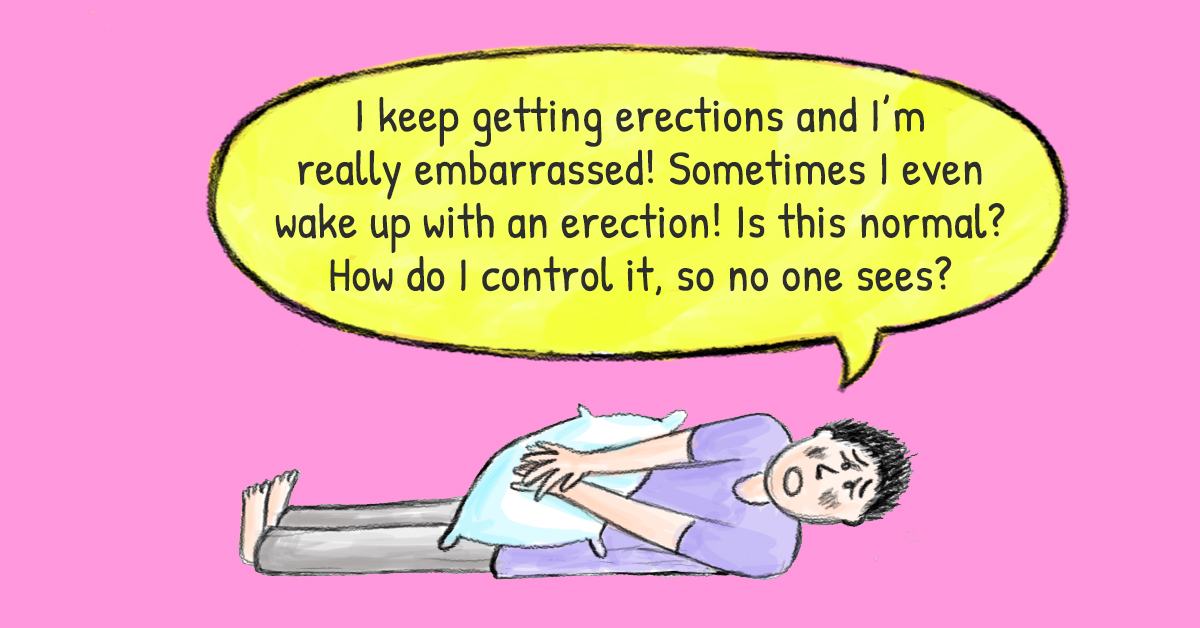 Accha, so shuru karte hain basics se. When your blood rushes to your penis, it may expand and stand out from the body — isko kehte hain erection. And it often (but not always) happens when you get tingly, pleasurable thoughts. Shayad lage ki you’re the only one walking around with awkward erections, but nope...saare penis-walon ko hota hai! Erections are normal. They can occur at any time of day, at any place, and will be quite common through your lives. And when they show up unexpectedly, they’re embarrassing for everyone. But don’t stress. You will soon figure out how to adjust it as you walk so that it does not feel too awkward. Erections can also happen while you are asleep or when you wake up (morning wood). Sometimes, you may even have a “wet dream”, which is when your penis may discharge semen at night and “wet the bed” (though not quite in the same way as you did when you were a kid). All this is your body gearing up to generate testosterone in preparation for sexual maturity. In other words, welcome to adulthood bacchu!
Accha, so shuru karte hain basics se. When your blood rushes to your penis, it may expand and stand out from the body — isko kehte hain erection. And it often (but not always) happens when you get tingly, pleasurable thoughts. Shayad lage ki you’re the only one walking around with awkward erections, but nope...saare penis-walon ko hota hai! Erections are normal. They can occur at any time of day, at any place, and will be quite common through your lives. And when they show up unexpectedly, they’re embarrassing for everyone. But don’t stress. You will soon figure out how to adjust it as you walk so that it does not feel too awkward. Erections can also happen while you are asleep or when you wake up (morning wood). Sometimes, you may even have a “wet dream”, which is when your penis may discharge semen at night and “wet the bed” (though not quite in the same way as you did when you were a kid). All this is your body gearing up to generate testosterone in preparation for sexual maturity. In other words, welcome to adulthood bacchu! 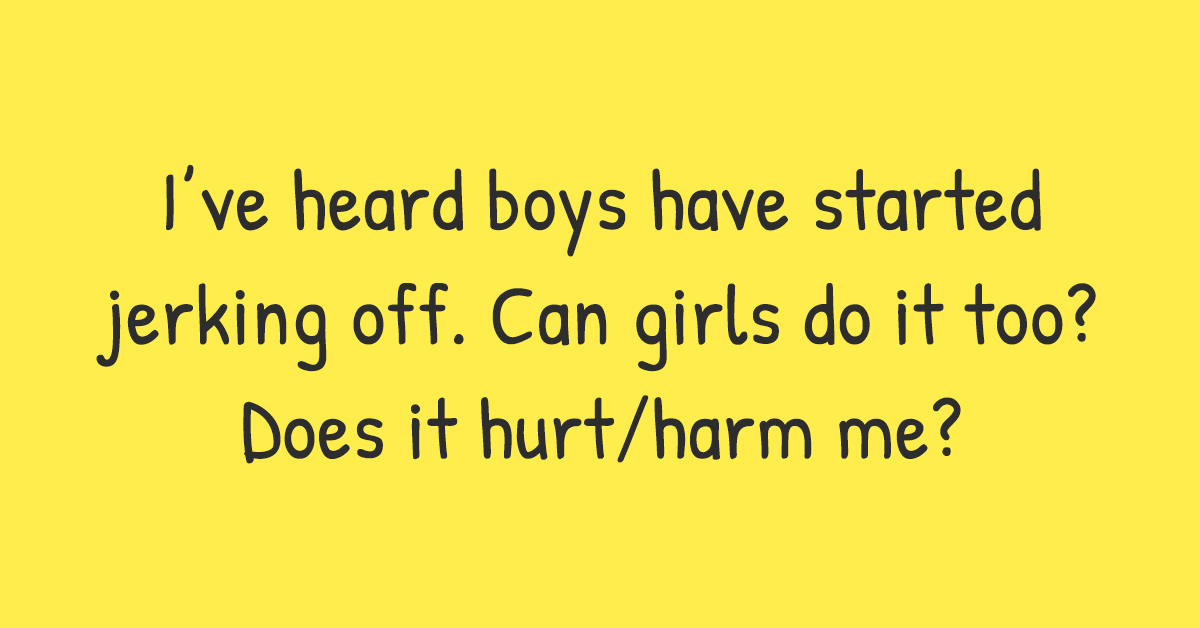 Kisne kaha only penis-wale masturbate? If it seems like only people with penises are masturbating, it’s because jerking off helps ease the discomfort of inconveniently frequent erections (see above). This is why ‘boys’ often discover the world of masturbation sooner than others. Also, culture tends to be hush-hush around feminine sexuality and often recognises only penis-wale as sexual beings, which may be why you’re only hearing about boys jerking off. But sab karte hain masturbate! Masturbating helps release happy-making hormones. It’s also a great way to find out what brings you pleasure. Play around with different parts of your body (breasts and genitals are usually very responsive) and find out what arouses you. Masturbation should never hurt and don’t force yourself to try something just because someone else said it worked for them. Simply follow your own body’s leads. Our masturbation archives may have more useful info.
Kisne kaha only penis-wale masturbate? If it seems like only people with penises are masturbating, it’s because jerking off helps ease the discomfort of inconveniently frequent erections (see above). This is why ‘boys’ often discover the world of masturbation sooner than others. Also, culture tends to be hush-hush around feminine sexuality and often recognises only penis-wale as sexual beings, which may be why you’re only hearing about boys jerking off. But sab karte hain masturbate! Masturbating helps release happy-making hormones. It’s also a great way to find out what brings you pleasure. Play around with different parts of your body (breasts and genitals are usually very responsive) and find out what arouses you. Masturbation should never hurt and don’t force yourself to try something just because someone else said it worked for them. Simply follow your own body’s leads. Our masturbation archives may have more useful info. 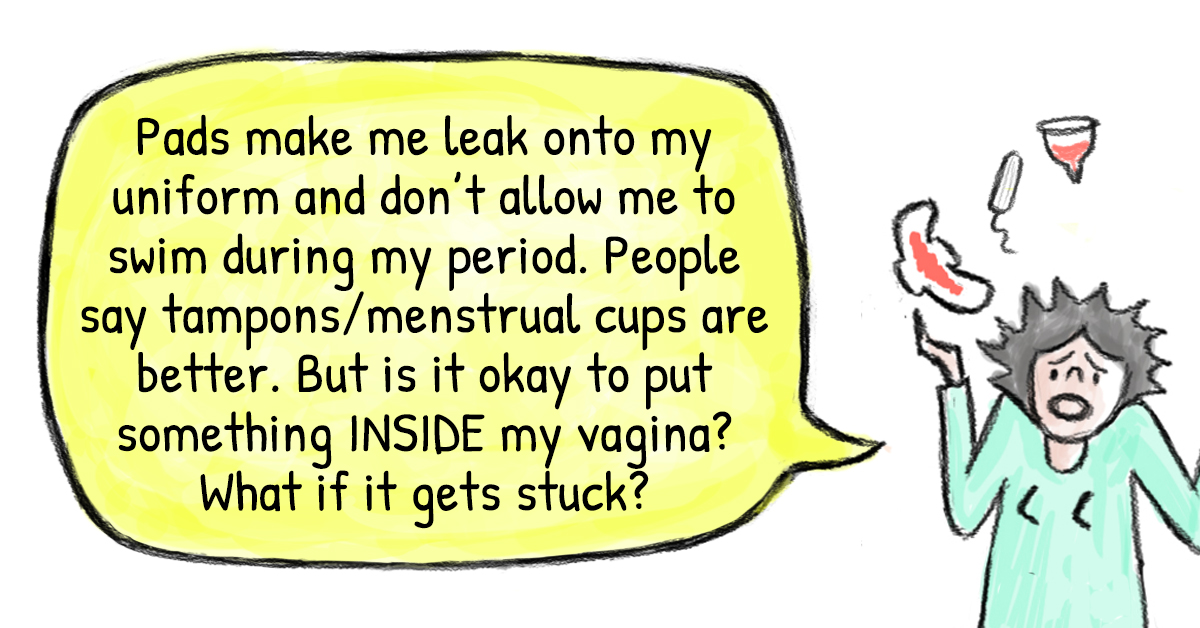 Don’t worry about inserting things into your vagina because there’s no chance of either tampons or menstrual cups getting lost inside it. There’s actually more chance of it falling out because it hasn’t been inserted properly. The muscles of your vaginal cavity hold tampons in place and menstrual cups use suction to do the same. It should not hurt to insert or remove. Ideally, you should not even feel their presence once they’re properly in place. If you’re worried these menstrual products will “break your hymen”, know that the hymen can break doing totally non-penetrative activities, like dancing and exercise. The hymen gets itna cultural importance because it’s supposedly a virginity-meter, but actually, it has very little to do with virginity. It’s just a piece of useless tissue that tears easily. In most cases, you won’t even know when your hymen “breaks”. Now for the useful info. There’s a range of menstrual products you can use— sanitary pads, menstrual cups, tampons, period panties. Remember that each body is different and each product has its pros and cons.. Before deciding on a product, look it up online or talk to someone who has used it to get a sense of whether it will serve your needs. For instance, tampons and menstrual cups both allow freedom of motion and are safe to use if you’re swimming, but if you want to use menstrual cups, you must have easy access to a bathroom where you can wash the cup each time it needs changing. Before using a product, just be sure to read its guidelines carefully.
Don’t worry about inserting things into your vagina because there’s no chance of either tampons or menstrual cups getting lost inside it. There’s actually more chance of it falling out because it hasn’t been inserted properly. The muscles of your vaginal cavity hold tampons in place and menstrual cups use suction to do the same. It should not hurt to insert or remove. Ideally, you should not even feel their presence once they’re properly in place. If you’re worried these menstrual products will “break your hymen”, know that the hymen can break doing totally non-penetrative activities, like dancing and exercise. The hymen gets itna cultural importance because it’s supposedly a virginity-meter, but actually, it has very little to do with virginity. It’s just a piece of useless tissue that tears easily. In most cases, you won’t even know when your hymen “breaks”. Now for the useful info. There’s a range of menstrual products you can use— sanitary pads, menstrual cups, tampons, period panties. Remember that each body is different and each product has its pros and cons.. Before deciding on a product, look it up online or talk to someone who has used it to get a sense of whether it will serve your needs. For instance, tampons and menstrual cups both allow freedom of motion and are safe to use if you’re swimming, but if you want to use menstrual cups, you must have easy access to a bathroom where you can wash the cup each time it needs changing. Before using a product, just be sure to read its guidelines carefully. 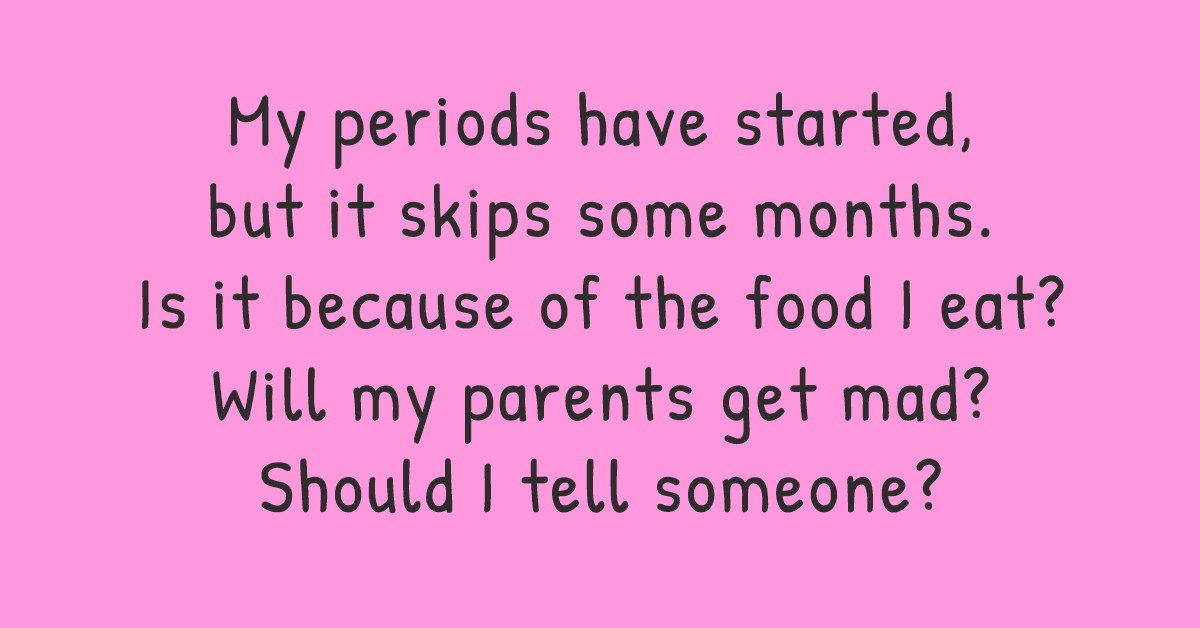 Nothing feels more bhayanak than missing a period, especially since so much of pop culture drills it into our head that skipping a period must mean pregnancy. However, in the first few years of menstruation, it is completely normal to have irregular periods. Irregular can mean many things – less/more flow in certain months, skipping a period, fluctuating durations of period, or even suddenly starting to menstruate when it’s not your time. Once your period has settled, an average period cycle is usually between 24 and 28 days long, and lasts for 3-7 days at a time. Yes, external factors like exercise, nutritional levels and stress do affect period irregularity, but if the fluctuations are minor, there’s no reason to worry. If your periods are extremely irregular and do not stabilise within two to three years, or cause you sudden/ intense pain, you should inform adults around you and consult a doctor, to be safe. Try tracking your period by noting down details (like duration, dates, symptoms during and before) or using an app like Flow or MyTracker.
Nothing feels more bhayanak than missing a period, especially since so much of pop culture drills it into our head that skipping a period must mean pregnancy. However, in the first few years of menstruation, it is completely normal to have irregular periods. Irregular can mean many things – less/more flow in certain months, skipping a period, fluctuating durations of period, or even suddenly starting to menstruate when it’s not your time. Once your period has settled, an average period cycle is usually between 24 and 28 days long, and lasts for 3-7 days at a time. Yes, external factors like exercise, nutritional levels and stress do affect period irregularity, but if the fluctuations are minor, there’s no reason to worry. If your periods are extremely irregular and do not stabilise within two to three years, or cause you sudden/ intense pain, you should inform adults around you and consult a doctor, to be safe. Try tracking your period by noting down details (like duration, dates, symptoms during and before) or using an app like Flow or MyTracker. 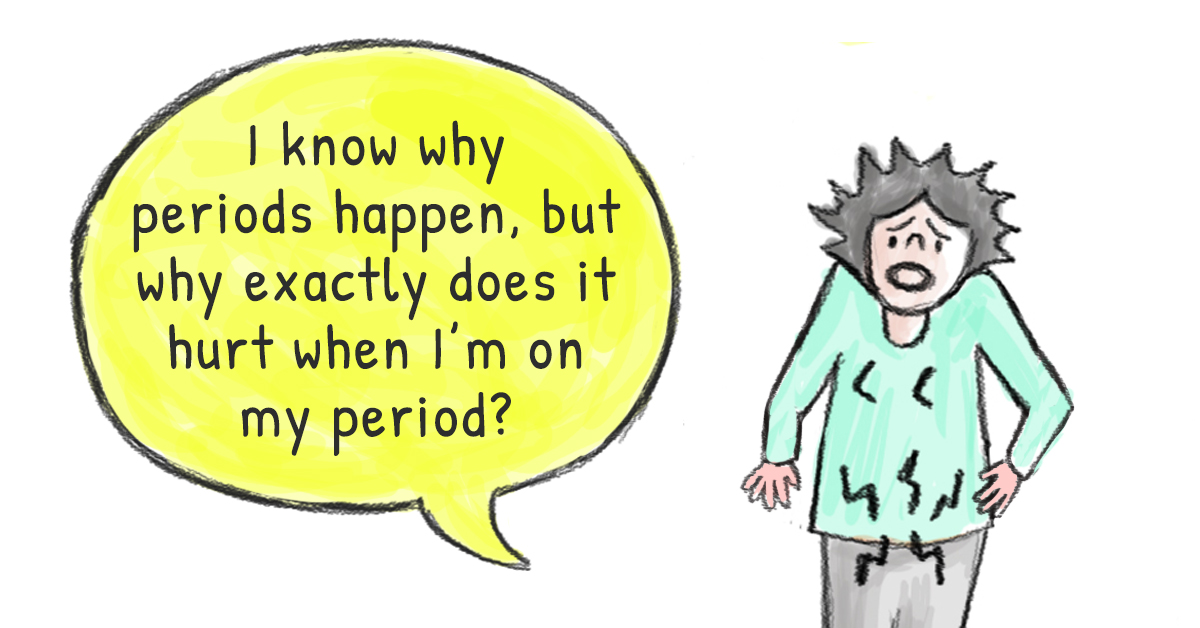 Cramps in your pelvic region, back, and stomach during your periods are simply the walls of your uterus contracting, which leads to muscle aches in other parts of your body. To ease the pain, try finding a comfy position (cuddling up with a big pillow, for instance), using hot water packs, taking a hot water shower, exercising (yes, this does help!), and in extreme cases, taking anti-inflammatory medicines. Don’t pop pills without consulting a doctor. If you’re feeling intense pain/discomfort, it could be a sign of PCOD or adolescent dysmenorrhea (extreme cramps which may cause dizziness, fainting, fatigue, nausea/vomiting, pain in the abdomen or legs, etc.) and you should definitely see a doctor.
Cramps in your pelvic region, back, and stomach during your periods are simply the walls of your uterus contracting, which leads to muscle aches in other parts of your body. To ease the pain, try finding a comfy position (cuddling up with a big pillow, for instance), using hot water packs, taking a hot water shower, exercising (yes, this does help!), and in extreme cases, taking anti-inflammatory medicines. Don’t pop pills without consulting a doctor. If you’re feeling intense pain/discomfort, it could be a sign of PCOD or adolescent dysmenorrhea (extreme cramps which may cause dizziness, fainting, fatigue, nausea/vomiting, pain in the abdomen or legs, etc.) and you should definitely see a doctor. 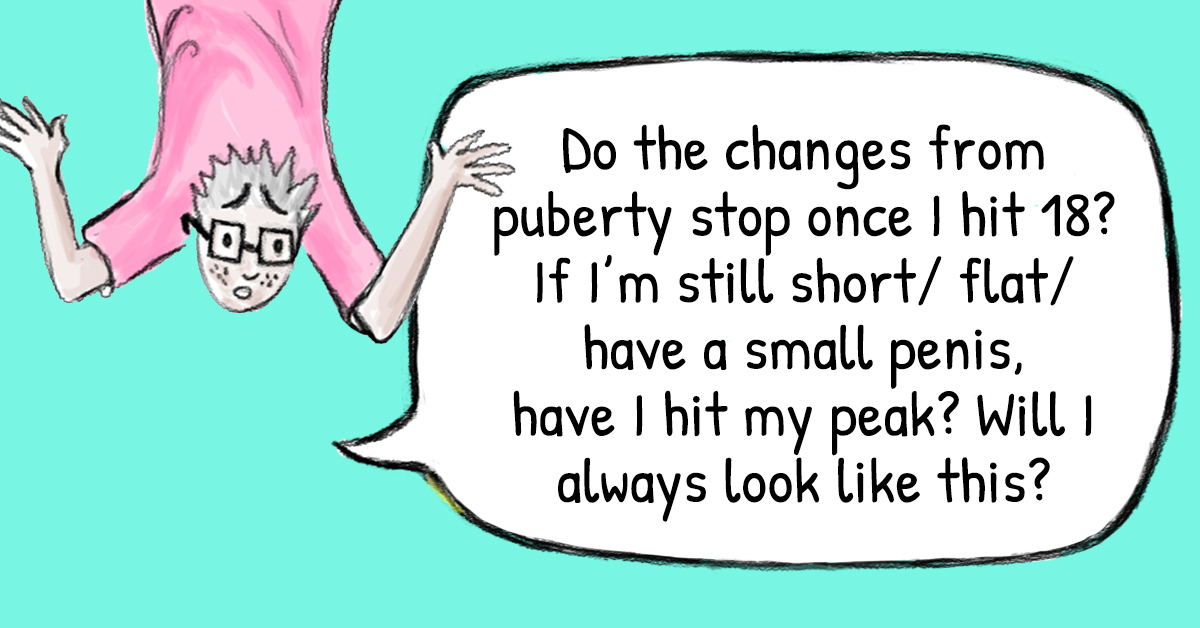 A lot of what puberty does to your body and how long it will go on depends on your sex. Height - This is dictated largely by your genetics and hormones. Vagina-owners usually grow pehle, and stop around the age of 17-18. People of other sexes have their growth spurts a little later. In rare cases, people with penises continue to grow in their early twenties too. All you can do to aid the process is eat nutritious food and stay active. Boobs - Breasts grow steadily for about five years after they first develop and are thought to reach full maturity only after they start to lactate (usually, post pregnancy). Your boob size can sporadically change throughout your life, depending on factors like hormone levels and weight gain/ loss. If they’re feeling sore or tender, it might mean they’re changing in size or that you may start to menstruate soon. Just remember ki breasts ka koi ideal size nahi hota. Psst...because they comprise largely of fat, eating fat-rich foods like nuts, milk, papaya, soya, could aid in their growth during puberty, if that’s what you want. Penis - Another body part whose size really doesn’t matter. Whatever the length of your penis, you should be able to masturbate, ejaculate and (once you’re ready) enjoy sexual pleasure with your partner. That said, here’s some basic info — an average penis is a little over 5 inches when erect, and around 3.5 inches when flaccid. Your penis can appear small sometimes due to extra skin around the tip. Some people have a condition called micro-penis, in which, due to hormonal and genetic factors, their penises are smaller than average, but function the same as regular-sized penises. The most important thing to remember is that no matter what pop culture suggests, each body is different and there are many, many ways for bodies to be beautiful. Toh embrace your raging hormones with grins and not (as many) groans, kyunki puberty is a time for metamorphosis and change. And remember...it gets better!
A lot of what puberty does to your body and how long it will go on depends on your sex. Height - This is dictated largely by your genetics and hormones. Vagina-owners usually grow pehle, and stop around the age of 17-18. People of other sexes have their growth spurts a little later. In rare cases, people with penises continue to grow in their early twenties too. All you can do to aid the process is eat nutritious food and stay active. Boobs - Breasts grow steadily for about five years after they first develop and are thought to reach full maturity only after they start to lactate (usually, post pregnancy). Your boob size can sporadically change throughout your life, depending on factors like hormone levels and weight gain/ loss. If they’re feeling sore or tender, it might mean they’re changing in size or that you may start to menstruate soon. Just remember ki breasts ka koi ideal size nahi hota. Psst...because they comprise largely of fat, eating fat-rich foods like nuts, milk, papaya, soya, could aid in their growth during puberty, if that’s what you want. Penis - Another body part whose size really doesn’t matter. Whatever the length of your penis, you should be able to masturbate, ejaculate and (once you’re ready) enjoy sexual pleasure with your partner. That said, here’s some basic info — an average penis is a little over 5 inches when erect, and around 3.5 inches when flaccid. Your penis can appear small sometimes due to extra skin around the tip. Some people have a condition called micro-penis, in which, due to hormonal and genetic factors, their penises are smaller than average, but function the same as regular-sized penises. The most important thing to remember is that no matter what pop culture suggests, each body is different and there are many, many ways for bodies to be beautiful. Toh embrace your raging hormones with grins and not (as many) groans, kyunki puberty is a time for metamorphosis and change. And remember...it gets better!
Oye Hormones! What Are You Doing to Me?! 11 Worries We’ve Had About Puberty
Research and Writing by Nandini Sharma and Varsha Ramachandran
Score:
0/
Related posts
 How To Smell And Taste Good Down There
Partner going down on your buffet? Tips for a yummy garnish!…
How To Smell And Taste Good Down There
Partner going down on your buffet? Tips for a yummy garnish!…
 मैंने खुशी-खुशी अपना दिल उनको दिया, लेकिन उनको चाहिए थे बच्चे और एक देसी बहू
स्थायी बीमारी में डेटि…
मैंने खुशी-खुशी अपना दिल उनको दिया, लेकिन उनको चाहिए थे बच्चे और एक देसी बहू
स्थायी बीमारी में डेटि…
 If Life is Box Full of Chocolate Boys!
#HappyChocolateDay to the men who smile, are vulnerable, and…
If Life is Box Full of Chocolate Boys!
#HappyChocolateDay to the men who smile, are vulnerable, and…
 What is Fellatio? The AOI Sex Glossary
Is it ice-cream ka flavour, like pistachio? Well, it does ha…
What is Fellatio? The AOI Sex Glossary
Is it ice-cream ka flavour, like pistachio? Well, it does ha…
 Sorry Thank You Tata Bye Bye - A Music Video About Age of Marriage In Collaboration With Oxfam India
Sorry Thank You Tata Bye Bye - A Music Video About Age of Marriage In Collaboration With Oxfam India
 Ammuma’s Haircut and Her Romantic Past
If Ammuma's hair was one to divulge, what would it reveal ab…
Ammuma’s Haircut and Her Romantic Past
If Ammuma's hair was one to divulge, what would it reveal ab…
 It Was ‘Twilight’. I Woke Up Bisexual.
How one can stumble upon one's (bi)sexuality with the help o…
It Was ‘Twilight’. I Woke Up Bisexual.
How one can stumble upon one's (bi)sexuality with the help o…
 To All the Boys I Couldn't Love Before
What fleeting connections with many interesting men tell you…
To All the Boys I Couldn't Love Before
What fleeting connections with many interesting men tell you…
 Tell Me Tarot, Will He Ever Come Back?
After Manjari is ghosted, all search for closure leads to he…
Tell Me Tarot, Will He Ever Come Back?
After Manjari is ghosted, all search for closure leads to he…
 How My Girlfriend's Abortion Made Me A Better Man: A Comic
M's story about a life-changing incident.
How My Girlfriend's Abortion Made Me A Better Man: A Comic
M's story about a life-changing incident.
 Do You Know How to Give Women Orgasms?
This app will teach you how and we got some Agents to try it…
Do You Know How to Give Women Orgasms?
This app will teach you how and we got some Agents to try it…
 The AOI Queer Reading List: Desi Languages Version
Queer readings from non-English Indian languages.
The AOI Queer Reading List: Desi Languages Version
Queer readings from non-English Indian languages.
 What Makes Your Sexual Confidence Go Up and Down
Sexual confidence is like a Snakes and Ladders Game
What Makes Your Sexual Confidence Go Up and Down
Sexual confidence is like a Snakes and Ladders Game
 KISS MEIN KITNA HAI DUM: 19 KISS POEMS
Kisses that go from sweet to saucy, tender to raunchy, misch…
KISS MEIN KITNA HAI DUM: 19 KISS POEMS
Kisses that go from sweet to saucy, tender to raunchy, misch…
 Savita Bhabhi and I: A True Love Story
Here is something you should know about me. I wrote three st…
Savita Bhabhi and I: A True Love Story
Here is something you should know about me. I wrote three st…
 How Posing in the Nude Changed My Life
A young gay man who hates being touched, is awkward about ha…
How Posing in the Nude Changed My Life
A young gay man who hates being touched, is awkward about ha…


